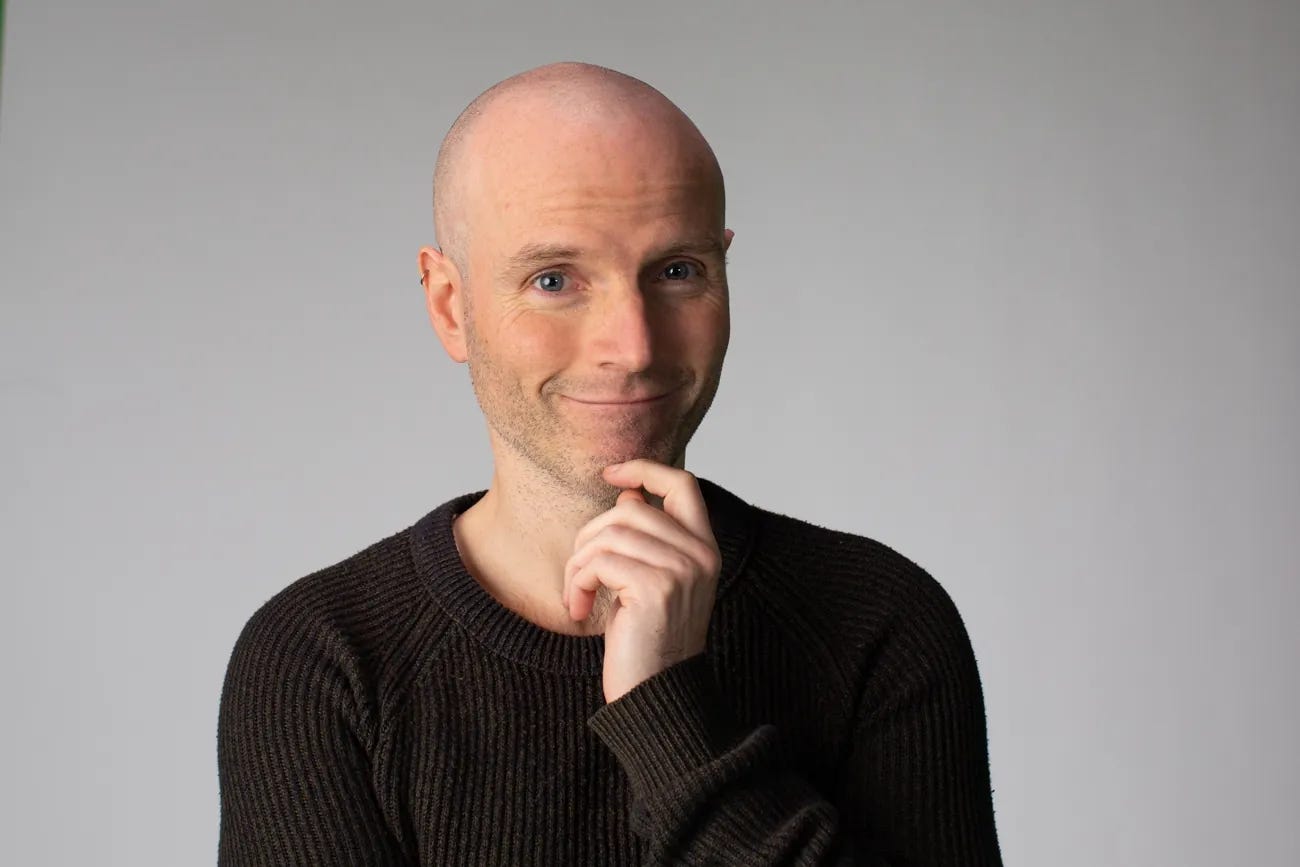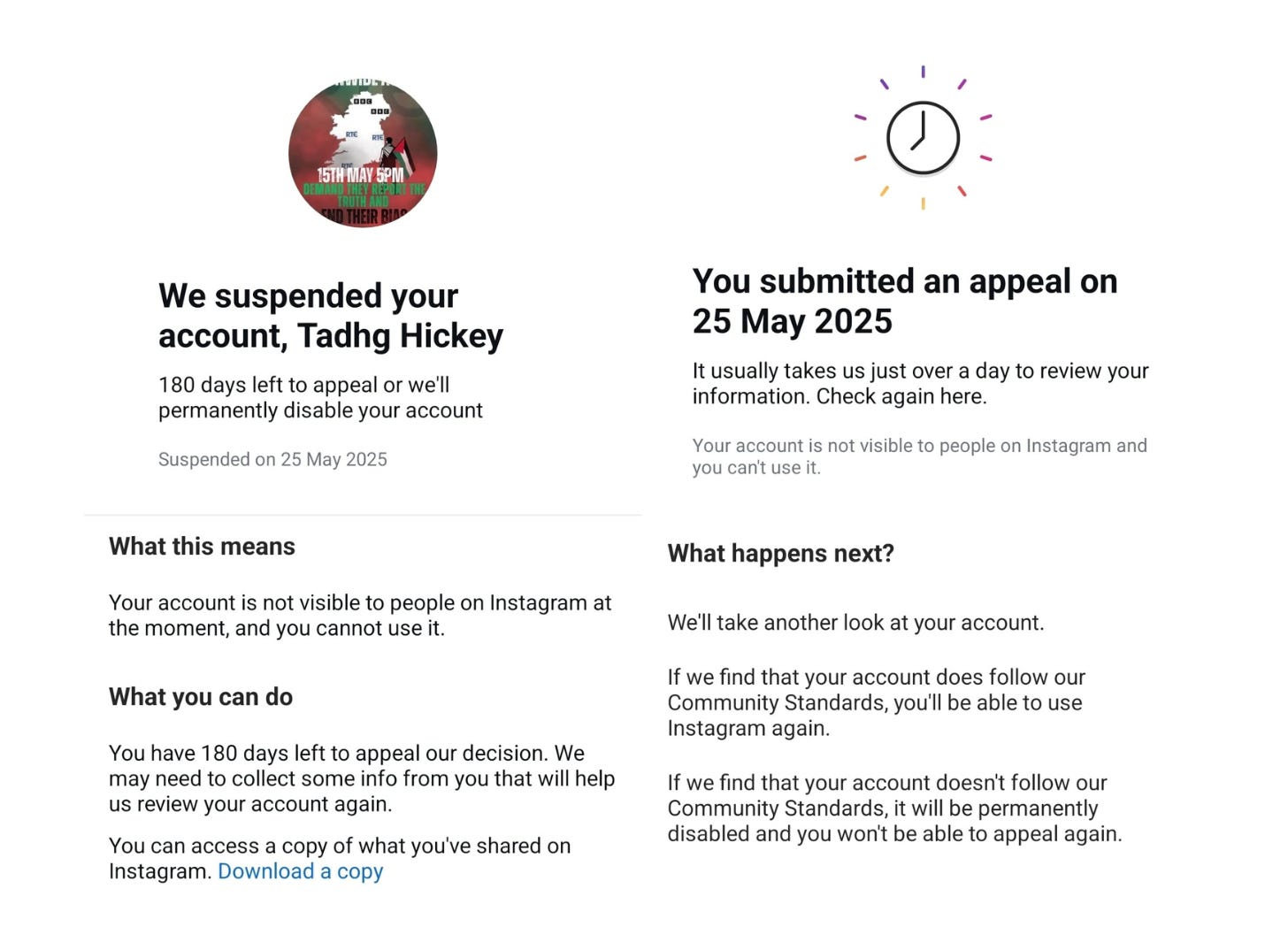'Oligarchs rule the world': Tadhg Hickey responds to Instagram ban over Gaza posts
The Irish comedian has amassed an online following for his pro-Palestine activism. It also put him in the crosshairs of Big Tech.
Tadhg Hickey woke up one morning to find his Instagram account – along with nearly 300,000 followers – vanished. No warning. No explanation. Just gone.
The Irish comedian and activist had long been outspoken about Israel’s actions in Gaza. But now, the consequences had become stark.
"I’m not massively surprised," he told Deepcut. "Every single pro-Palestine account I know, whether you’ve got 200 followers or 2 million, they all have these marks against them."
Last month, I wrote that those who speak out about Israel’s crimes in Gaza risk losing their free speech. Since then, the screws have only tightened.
Last week, Liam Óg Ó hAnnaidh, a member of the Irish band Kneecap, was charged with a terrorism offence in the UK. The alleged crime? Displaying a flag in support of Hezbollah at a concert in London last November.
On Sunday, the Twitch account of American progressive commentator, Hasan Piker, was suspended after he covered "the motives of the Israeli embassy shooter". Piker, who has 2.9 million followers on the platform, criticised the suspension as "bad policy for news and press freedom".
Hickey is no stranger to censorship on social platforms. He's previously had his TikTok removed and, on Tuesday, YouTube informed the influencer he could no longer monetise his content on the platform, citing "some elements" in Hickey's channel "that do not fully align" with YouTube's guidelines.
Hickey says he received warnings from a Meta insider roughly a month ago that he was "on a naughty list".
"I obviously have invisible enemies, and then I've obviously got a few invisible friends," he says of the insider connections he has established at both Meta and TikTok.
"They can, apparently, check your account to see how many marks are against it. The insider [at Meta] was kind of saying, you know, 'Just be careful. Don't do any collaborations because you're coming close to the edge here. You've got so many violations against you.'"
Removing the 'cog in the machine'
Hickey claims other pro-Palestine accounts were removed on Instagram at the same time, including young American Guy Christensen, who has over 400,000 followers, and Spanish sports journalist Leyla Hamed, with 140,000 followers.
The suspected final 'strike' was a collaboration with Palestinian-American influencer, @mo_hamz, who has also had his account removed.
"If you're very active and also if you kind of collaborate with other accounts, that can be used to have you taken down because you're kind of a cog in the machine overall," Hickey says.
"I was helping other pages to grow, particularly pro-Palestinian or Palestinian, be they journalists or humanitarian groups.
"So I think it would strategically be a good idea to take someone like me down because part of the infrastructure kind of goes down with me a little bit."
Both Christensen's and Hamed's accounts were active as of writing. Hickey's main account, however, is nowhere to be seen. Neither is @mo_hamz. Hickey has launched a backup Instagram account, @tadhghickey1.
Meta conflates Zionism with antisemitism
Meta has cast a wider net since the Gaza genocide began to ensnare criticism of Zionism within its parameters of "hateful conduct".
Jordana Cutler, Meta's public policy director for Israel and the Jewish diaspora, told a policy summit in Israel last month that Meta "updated our policies to recognise that the term Zionist can be used as a proxy for Jews and Israelis".
"We do not allow for dehumanising comparisons of Zionists," Cutler said.
Conflating Zionism with Jews and antisemitism has been condemned by numerous prominent Jewish voices, such as the Jewish Council of Australia, which says it is "inaccurate ... dangerous and risks fomenting antisemitism".
Hickey agrees.
"It just seems so ludicrous that you could conflate the two when they are so obviously distinct. I don't need to tell you that one is a political ideology that's, what, maybe about 150 years old. And the other is an ancient religion with all this history and majesty," he says.
"If you shut someone down for saying, 'Israel should stop killing children and killing women and targeting aid workers' ... if that's antisemitic, then are you saying that killing children and women and aid workers is inherently part of what Judaism stands for? It's just absolutely mental."
Oligarchs rule the world
Beneath the layer of controversial social media bans and suspensions is the heavy question of who controls free speech in the west.
"What has been revealed after the genocide is that the oligarchs now rule the world – the Metas and the Googles rule the world, and more so than the newspapers even. They set the agenda in many ways," Hickey says.
"And we're seeing that free speech is kind of an illusion because you can say what you want so long as it fits in with the overall worldview of this class of billionaires."
Hickey suggests that many westerners, observing how a genocide in a corner of West Asia has morphed into an international battle over free speech, are awakening to the realisation that such freedom may never have truly existed.
"I would say that free speech post-Gaza has become a little bit like international law. A lot of people in the Global South, I would say, probably recognise that those things never existed, but a lot of people in the west probably went to bed at night thinking basically there is international law, there is humanitarian law, there is free speech, and we're very lucky in the west we can say what we want."
The problem, Hickey adds, is that "free speech is only being used as this blunt tool to silence the voices that we don't want to hear".
'There's a world outside the Anglosphere'
Account deletions are not deterring Hickey from continuing on his path of combining his comedic craft with advocacy for Palestinian and broader human rights.
"There is a world out there that is not the fucking US, Britain, Australia and Canada. There's a whole world outside of the western paradigm. And so I could do a world tour but I'd actually go around the world."
The Irish comedian has a Patreon for people to support his work and plans to launch his own satire show that "actually lampoons all these institutions that we hold dear in the west" and "the idea that we're the good guys and all those brown and black countries are the bad guys".
His message for others hesitant to post in solidarity with Palestine is to press ahead, "do your own thing and collaborate with other people doing their own things".
"They want us isolated. They want me to just be gone from Instagram and that's me out of the equation.
"But it's when you connect, collaborate and organise – that doesn't allow them to pick you off effectively. That's what terrifies them and I think that's the future because we're battling not just for Palestine, we're battling for fucking humanity and the planet."
Things that caught my eye in West Asia:
Lebanon held its first municipal elections since 2016, with Hezbollah maintaining its popularity despite losing its leadership in the recent war with Israel. Hezbollah, along with its local ally, Amal, won contests throughout predominantly Shiite areas in south Lebanon, the Bekaa and Beirut.
US-backed efforts to disarm Hezbollah and Palestinian factions in Lebanon continue nonetheless. Mahmoud Abbas, the widely unpopular octogenarian Palestinian Authority president, was in Lebanon last week to lend his support for the disarming of Palestinian factions in the country (read Hamas and Islamic Jihad, his two main rivals). "The era of weapons operating outside the authority of the Lebanese state is over," a joint statement issued by Abbas and Lebanese president Joseph Aoun said.
Syria's new regime is also playing its part, reportedly intercepting a smuggled weapons shipment intended for Hezbollah. The targeting of Hezbollah's weapons comes as Syria's leadership continues direct talks with Israel – another goodwill gesture to win approval from Benjamin Netanyahu?
Turkey and Israel have also reportedly agreed to dial down tensions in Syria, and have established a hotline to prevent unwanted incidents.
Bypassing US sanctions may have just gotten easier for Iran with the opening of a new rail corridor to China. The first freight train from China arrived in Iran in 15 days and provides a handy alternative to sea routes exposed to the US navy, as noted by online observers.
On Iran, Donald Trump apparently held a "highly charged and tense" phone call with Netanyahu last week, according to Israel's Channel 12. "I want a diplomatic solution with the Iranians. I believe in my ability to make a good deal," he reportedly told the Israeli PM. The call occurred a day before Iran and the US held their fifth round of nuclear talks in Rome, where "some but not conclusive progress" was made, according to Oman.
European nations are, finally, talking sanctions against Israel. But it's still just talk. Spain's parliament passed a non-binding resolution last week calling for a full arms embargo on Israel, and its foreign minister called on the international community to impose sanctions on Israel. Ireland made steps towards banning trade with Israeli firms in the Occupied Palestinian Territories - a symbolic move as Ireland trades very little with the settlements. And Sweden's prime minister, Ulf Kristersson, called on the EU to impose sanctions on Israel.
Why West Asia and not Middle East?
"Middle East" is a Eurocentric and colonial way of looking at the region, as it was a term first coined by the British in the 19th century and deployed by the US in the early 20th century.
West Asia positions the region in its geographical setting, within its continent.




